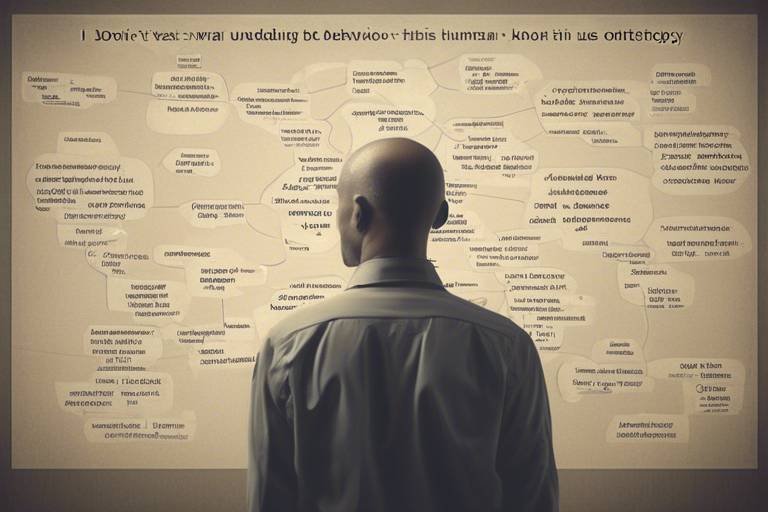Decoding the Constitution of Reality - An Ontological Analysis
This article delves into the intricate layers of reality through an ontological lens, exploring the fundamental nature of existence, perception, and the philosophical implications of our understanding of reality. In a world where the lines between what is real and what is perceived often blur, it's crucial to unpack these concepts. What does it mean to exist? How do we define reality? These questions are not just philosophical musings; they are essential to our understanding of life itself. By examining the interplay of ontology and reality, we can gain insights into our own existence and the universe that surrounds us.
Ontology is the philosophical study of being and existence. It’s a field that has evolved over centuries, shaped by the thoughts of great philosophers like Aristotle, Kant, and Heidegger. At its core, ontology seeks to answer questions about what entities exist and how they can be categorized and related within a hierarchy. The significance of ontology goes beyond mere academic interest; it influences how we perceive the world and our place within it. Understanding ontology is like holding a map that guides us through the complex terrain of existence. Without it, we might wander aimlessly, lost in a maze of perceptions and beliefs.
What constitutes reality? This question has puzzled thinkers for ages. To explore this, we must dive into various philosophical perspectives that attempt to define reality. Materialism argues that only physical matter exists; in other words, if you can't touch it, it doesn't exist. On the other hand, idealism posits that reality is mentally constructed, suggesting that our thoughts and perceptions shape the world around us. Then there's dualism, which asserts that both material and immaterial substances exist, creating a complex interplay between the physical and the mental. These viewpoints not only shape our understanding of existence but also influence our daily lives and interactions.
Materialism and idealism represent two foundational perspectives in ontology. Materialism posits that only physical matter is real, dismissing anything that cannot be observed or measured as mere illusion. This perspective has profound implications, particularly in the realm of science, where empirical evidence reigns supreme. In contrast, idealism suggests that reality is a construct of our minds. This view opens up a world of possibilities, where thoughts and consciousness play a crucial role in shaping our experiences. Imagine walking through a forest; a materialist would focus on the trees, the soil, and the air, while an idealist might ponder how the experience of the forest affects their thoughts and feelings. This dichotomy raises significant questions about the nature of existence and our place in it.
The debate between materialism and idealism significantly influences scientific inquiry and methodology. Materialists advocate for a rigorous, empirical approach to understanding the universe, relying on observable phenomena and measurable data. This has led to groundbreaking discoveries and technological advancements. However, idealists argue that this focus on the physical may overlook the complexities of consciousness and subjective experience. For instance, consider the study of consciousness itself. A materialist might approach it as a byproduct of brain activity, while an idealist might argue that consciousness is fundamental to understanding reality. This ongoing dialogue shapes the evolution of scientific thought and exploration.
The conflict between materialism and idealism also extends to spirituality. Materialists often view spiritual beliefs as constructs of the human mind, while idealists may see them as reflections of a deeper, interconnected reality. This discussion affects beliefs about consciousness, the soul, and the nature of the divine. For many, spirituality offers a sense of purpose and connection that transcends the physical world. The implications of these perspectives can be profound, as they influence not only personal beliefs but also societal norms and values.
Dualism, the belief in both material and immaterial substances, raises questions about the interaction between mind and body. How can something non-physical affect something physical? This conundrum has led to critiques of dualistic thought in contemporary philosophy. Critics argue that dualism creates an unnecessary divide between the mind and body, complicating our understanding of consciousness. For instance, consider the experience of pain. Is it merely a physical sensation, or does it encompass emotional and psychological dimensions? This complexity challenges dualistic frameworks and invites a more integrated understanding of existence.
Perception plays a crucial role in shaping our understanding of reality. Our senses and cognitive processes filter our experiences, creating a subjective interpretation of the world around us. Imagine watching a sunset; while one person might see it as a beautiful end to the day, another might feel a sense of melancholy. This variability highlights how perception can alter our reality. Constructivist perspectives suggest that knowledge is constructed rather than discovered, emphasizing the role of individual experiences in shaping our understanding of existence. This notion has significant implications for education and personal development, as it encourages us to embrace diverse viewpoints and cultivate critical thinking.
Constructivism challenges the traditional notion of knowledge as a fixed entity. Instead, it posits that our understanding of reality is shaped by our interactions and experiences. This approach fosters a more dynamic view of existence, where learning becomes a collaborative and evolving process. Imagine a classroom where students are encouraged to share their perspectives and build knowledge together. Such an environment not only enhances understanding but also nurtures creativity and critical thinking. In this sense, constructivism offers a fresh lens through which to view reality, reminding us that our perceptions are not merely reflections of an objective world but are actively shaped by our experiences.
Phenomenology emphasizes the importance of subjective experience in understanding reality. It invites us to delve into our lived experiences, examining how they contribute to our comprehension of existence. This approach encourages us to reflect on our feelings, thoughts, and perceptions, recognizing that they are integral to our understanding of reality. For instance, consider a moment of joy; it’s not just a fleeting emotion but a profound experience that shapes how we view the world. By embracing phenomenology, we can appreciate the richness of existence and the unique tapestry of experiences that define our lives.
- What is ontology? Ontology is the philosophical study of being and existence, exploring the nature of reality and what it means to exist.
- How do materialism and idealism differ? Materialism asserts that only physical matter exists, while idealism claims that reality is mentally constructed.
- What is dualism? Dualism is the belief in both material and immaterial substances, raising questions about the interaction between mind and body.
- How does perception influence reality? Perception shapes our understanding of reality by filtering our experiences and creating subjective interpretations.
- What is constructivism? Constructivism suggests that knowledge is constructed through experiences and interactions, emphasizing the collaborative nature of learning.

Understanding Ontology
Ontology is a fascinating branch of philosophy that dives deep into the very essence of being and existence. Imagine standing at the edge of a vast ocean, where every wave represents a different aspect of reality. Just as the ocean is made up of countless droplets of water, our understanding of existence is composed of myriad concepts and theories. Historically, ontology has evolved through the ages, influenced by great thinkers such as Aristotle, Descartes, and Kant. These philosophers laid the groundwork for how we perceive reality today.
At its core, ontology seeks to answer fundamental questions about what it means to exist. It challenges us to ponder, “What is the nature of reality?” and “What entities populate our universe?” Through this lens, we can explore various key concepts, including:
- Being: The fundamental state of existence.
- Substance: What things are made of, both materially and immaterially.
- Identity: How we define and differentiate entities.
- Space and Time: The dimensions in which existence unfolds.
Understanding ontology is not just an academic exercise; it has profound implications for how we comprehend our place in the universe. For instance, consider the implications of a materialistic view versus an idealistic one. Materialism asserts that only physical substances exist, while idealism posits that reality is fundamentally mental or spiritual. This dichotomy shapes our worldview and influences everything from scientific inquiry to personal beliefs.
In essence, ontology serves as a bridge connecting us to the broader questions of existence. It invites us to engage with the world around us, encouraging an exploration of the unseen forces that shape our lives. As we delve deeper into this philosophical territory, we begin to appreciate the complexity of existence and the myriad perspectives that have emerged throughout history.
To further enrich our understanding, it’s essential to recognize how ontology intersects with other fields such as metaphysics, epistemology, and even science. Each of these disciplines contributes unique insights that enhance our comprehension of existence. For example, metaphysics often delves into questions about what lies beyond the physical world, while epistemology focuses on the nature of knowledge itself.
Ultimately, ontology challenges us to reflect on our beliefs and assumptions about reality. It encourages a dialogue between the known and the unknown, prompting us to ask ourselves: “What do I truly believe about existence?” and “How does my perception of reality shape my experiences?” By engaging with these questions, we can begin to unravel the intricate tapestry of existence and our place within it.
- What is ontology? Ontology is the philosophical study of being, existence, and the nature of reality.
- Why is ontology important? It helps us understand fundamental questions about existence, identity, and the universe.
- How does ontology relate to other philosophical disciplines? Ontology intersects with metaphysics, epistemology, and even science, enriching our understanding of existence.
- Can ontology influence personal beliefs? Yes, our ontological views can shape our perceptions of reality and inform our beliefs about life and existence.

The Nature of Reality
What really constitutes reality? This question has puzzled philosophers, scientists, and thinkers for centuries. To dive into this profound inquiry, we must explore various philosophical perspectives that shape our understanding of the world around us. Reality is not just a mere backdrop to our lives; it is a complex tapestry woven from threads of perception, belief, and existence itself. Each perspective offers a unique lens through which we can examine our place in the universe.
One of the most significant philosophical views is materialism, which posits that only physical matter exists. According to materialists, everything we observe is a product of interactions between tangible entities. This perspective aligns closely with the scientific method, which emphasizes observation and experimentation. In contrast, idealism asserts that reality is fundamentally mental or spiritual. Idealists argue that our perceptions and consciousness shape the world around us, suggesting that ideas and thoughts are the primary building blocks of existence.
To illustrate this dichotomy, consider the following table:
| Perspective | Definition | Implications |
|---|---|---|
| Materialism | Only physical matter exists. | Reality is objective and can be studied through science. |
| Idealism | Reality is mentally constructed. | Subjective experiences shape our understanding of existence. |
These contrasting views significantly influence how we interpret our experiences and the world at large. For instance, a materialist might argue that consciousness arises from brain activity, while an idealist might contend that consciousness is a fundamental aspect of the universe that shapes material reality. This debate doesn’t just stay in the realm of philosophy; it spills into our everyday lives and affects everything from scientific research to personal beliefs about existence.
Furthermore, the implications of these perspectives extend beyond the academic realm. They affect how we perceive our place in the universe and our relationships with others. For example, if one subscribes to a materialist view, they may prioritize physical achievements and tangible results. In contrast, an idealist might focus on emotional and spiritual growth, believing that our thoughts and feelings are paramount to understanding reality.
But what about dualism? This perspective introduces another layer of complexity by suggesting that both material and immaterial substances exist. Dualists argue that the mind and body are distinct entities that interact in profound ways. This raises intriguing questions: How does the mind influence the body? Can thoughts manifest into reality? These inquiries challenge our understanding of existence and prompt us to consider the interconnectedness of all aspects of life.
In summary, the nature of reality is a multifaceted concept influenced by various philosophical perspectives. Each viewpoint offers valuable insights into our existence, whether it be through the lens of materialism, idealism, or dualism. As we navigate our lives, these perspectives shape our understanding and interactions with the world, reminding us that reality is not just what we see, but also how we perceive and interpret our experiences.
- What is the difference between materialism and idealism?
Materialism focuses on the physical existence of matter, while idealism emphasizes the role of consciousness and ideas in shaping reality. - How does dualism relate to the mind-body problem?
Dualism posits that the mind and body are separate entities, raising questions about how they interact and influence each other. - Can our perceptions change reality?
According to idealism, our perceptions can shape our understanding of reality, suggesting that consciousness plays a significant role in defining existence.

Materialism vs. Idealism
When we dive into the philosophical waters of materialism and idealism, we find ourselves navigating a fascinating debate that has shaped human thought for centuries. At its core, materialism asserts that the only things that truly exist are those that can be observed and measured—essentially, the physical world. Think of it as a firm handshake with reality, where everything you can touch, see, or quantify holds significance. On the flip side, idealism posits that reality is fundamentally mental or spiritual. In this view, the world we experience is a construct of our minds, colored by perceptions, beliefs, and consciousness.
This dichotomy raises intriguing questions: Can something exist if we cannot perceive it? Is the universe merely a canvas painted by our thoughts? These questions lead us to explore the implications of each perspective. Materialism has a stronghold in the scientific community, where empirical evidence reigns supreme. Scientists often operate under the assumption that the universe is a tangible entity governed by laws that can be discovered through observation and experimentation. In contrast, idealism invites us to consider the profound influence of our mental states on our understanding of existence. This perspective suggests that our thoughts, feelings, and consciousness are not just byproducts of our physical bodies, but rather integral components of reality itself.
To illustrate the differences more clearly, consider the following table:
| Aspect | Materialism | Idealism |
|---|---|---|
| Definition | Belief that only physical matter exists. | Belief that reality is mentally constructed. |
| Focus | Empirical evidence and scientific inquiry. | Consciousness and subjective experience. |
| Implications | Reality is objective and measurable. | Reality is subjective and interpretative. |
The implications of these perspectives extend beyond academia into our daily lives. For instance, if we lean towards materialism, we might prioritize scientific advancements and technological innovations, believing that they are the keys to understanding our existence. On the other hand, if we adopt an idealistic viewpoint, we may find ourselves drawn to art, spirituality, and the exploration of consciousness, seeking deeper meanings in our experiences rather than just cold, hard facts.
Interestingly, these two perspectives can sometimes lead to conflict, especially in discussions about consciousness and the nature of the universe. Materialists may argue that consciousness is merely a product of brain activity, while idealists might contend that consciousness plays a foundational role in shaping reality itself. This debate can feel like trying to solve a puzzle with missing pieces, leaving us to wonder about the true nature of our existence.
In conclusion, the clash between materialism and idealism is not just a philosophical exercise; it is a lens through which we can examine our beliefs, values, and the very fabric of reality. As we continue to explore these profound questions, we may find that the answers are as layered and complex as the universe itself.
- What is materialism? Materialism is the belief that only physical matter exists and that everything can be explained through physical laws and empirical evidence.
- What is idealism? Idealism is the philosophical view that reality is fundamentally mental or spiritual, suggesting that our perceptions shape our understanding of existence.
- How do materialism and idealism impact science? Materialism underpins scientific inquiry, focusing on observable phenomena, while idealism challenges scientists to consider the role of consciousness in understanding reality.
- Can materialism and idealism coexist? While they represent opposing viewpoints, some thinkers suggest that a synthesis of both perspectives may provide a more comprehensive understanding of existence.

Impacts on Science
When we talk about the impacts of materialism and idealism on science, we're diving into a fascinating realm where philosophy and empirical inquiry intersect. Science, at its core, seeks to understand the universe through observation, experimentation, and reasoning. But how do these ontological perspectives influence what we consider to be valid knowledge? Materialism, with its emphasis on physical matter, has historically dominated the scientific landscape. It posits that only what can be measured and observed is real, leading to a focus on tangible phenomena. This view has propelled advancements in fields like physics and chemistry, where empirical data reigns supreme.
On the flip side, idealism challenges this notion by suggesting that reality is fundamentally shaped by our perceptions and mental constructs. This raises intriguing questions: If our thoughts and beliefs shape our understanding of reality, how do we account for subjective experiences in scientific inquiry? Idealists argue that consciousness plays a crucial role in shaping our interpretations of data, suggesting that the observer cannot be separated from the observed. This perspective can lead to innovative methodologies in fields like psychology and sociology, where understanding human experience is paramount.
The tension between these two views has significant implications for scientific methodology. For instance, consider the following:
- Materialist Approach: Focuses on quantitative data, often sidelining qualitative aspects of human experience.
- Idealist Approach: Encourages a more holistic view, integrating subjective experiences into research, particularly in social sciences.
This dichotomy can be illustrated in a table that contrasts the two perspectives:
| Aspect | Materialism | Idealism |
|---|---|---|
| Nature of Reality | Physical and observable | Mental and constructed |
| Methodology | Quantitative, empirical | Qualitative, interpretive |
| Focus | External phenomena | Internal experience |
These contrasting methodologies not only affect how scientists conduct research but also influence the kinds of questions they ask. For example, a materialist scientist might focus on the biochemical processes of the brain, while an idealist might explore how consciousness shapes our perception of reality. This interplay is crucial in fields like neuroscience, where understanding the mind-body relationship can lead to profound insights.
Ultimately, the impacts of materialism and idealism on science are profound and multifaceted. They challenge researchers to consider not just the mechanics of the universe but also the essence of human experience. As we advance further into the 21st century, the dialogue between these perspectives will continue to shape the future of scientific inquiry, pushing us to explore the depths of both the external universe and our internal landscapes.
1. How do materialism and idealism differ in their approach to scientific inquiry?
Materialism focuses on observable phenomena and empirical data, while idealism emphasizes the role of consciousness and subjective experience in shaping our understanding of reality.
2. Can both perspectives coexist in scientific research?
Yes, many researchers integrate both materialist and idealist approaches to gain a more comprehensive understanding of complex phenomena, particularly in fields like psychology and sociology.
3. Why is it important to consider both materialism and idealism in science?
Considering both perspectives allows for a richer exploration of reality, acknowledging the complexity of human experience while still adhering to rigorous scientific methods.

Impacts on Spirituality
When we dive into the realm of spirituality, the divide between materialism and idealism becomes a fascinating battleground. On one side, materialism, with its unwavering focus on the physical world, often leads to a worldview where spiritual experiences are dismissed as mere byproducts of brain chemistry. This perspective can create a sense of disconnection from the spiritual realm, reducing profound experiences to mere neurological events. Imagine trying to appreciate a piece of art by only analyzing the paint and canvas—missing the emotional resonance and the artist's intent.
On the flip side, idealism opens the door to a more expansive understanding of spirituality. By asserting that reality is fundamentally mental, idealism suggests that our thoughts, beliefs, and consciousness play a pivotal role in shaping our spiritual experiences. This perspective encourages individuals to explore their inner worlds, fostering a connection to something greater than themselves. It invites questions like, "What if our thoughts can influence the universe?" or "Could our intentions shape our spiritual realities?" This line of thinking can lead to transformative practices such as meditation, affirmations, and visualization, which many find deeply enriching.
Moreover, the clash between these two philosophies impacts how individuals approach spirituality. For instance, those leaning towards materialism might seek tangible evidence of spiritual phenomena, often turning to scientific validation. They may ask, "Can we measure the effects of prayer or meditation on the brain?" In contrast, idealists may embrace a more subjective approach, valuing personal experiences and insights over empirical data. This divergence can create a rich tapestry of beliefs and practices in the spiritual landscape, as people navigate their paths based on their philosophical inclinations.
To further illustrate the impacts of these ontological positions on spirituality, let's consider the following table:
| Philosophical Perspective | Spiritual Implications |
|---|---|
| Materialism |
|
| Idealism |
|
In summary, the impact of materialism and idealism on spirituality is profound and multifaceted. While materialism may foster skepticism and a focus on the physical, idealism invites exploration of the inner self and encourages a deeper connection to the universe. This philosophical discourse ultimately shapes how individuals understand their spiritual journeys, leading to a diverse array of beliefs and practices in the quest for meaning and connection.
Q1: How does materialism affect spiritual beliefs?
A1: Materialism often leads to skepticism regarding spiritual experiences, viewing them as purely biological or neurological phenomena rather than genuine connections to a higher power or the universe.
Q2: Can idealism coexist with scientific inquiry?
A2: Yes, many people find that idealism complements scientific inquiry by suggesting that while the physical world is important, our consciousness and perceptions significantly influence our understanding of reality.
Q3: How can one reconcile materialistic and idealistic views in their spiritual practice?
A3: Individuals can explore both perspectives by embracing practices that honor both the physical and the mental aspects of existence, such as mindfulness, meditation, and reflective journaling.

Dualism and Its Challenges
Dualism, a philosophical stance that posits the existence of two distinct realms—material and immaterial—has been a cornerstone of metaphysical thought for centuries. This perspective suggests that the mind and body are fundamentally different substances, leading to intriguing yet complex questions about their interaction. Imagine a dance between two partners, each with its own rhythm and style, yet somehow, they must find a way to move together. This is the essence of dualism: the mind and body, while separate, are inextricably linked in the experience of being.
One of the most significant challenges posed by dualism is the so-called "mind-body problem." This issue raises profound questions: How can an immaterial mind influence a physical body? If the mind is non-physical, what mechanism allows it to interact with the brain and the nervous system? Think about it—if you stub your toe, the immediate response is physical pain, but where does the sensation originate? Is it in the brain, the mind, or somewhere else entirely? This dilemma has led to various interpretations and critiques of dualism, each attempting to bridge the gap between these two realms.
Critics of dualism often argue that it creates unnecessary complications in our understanding of consciousness and existence. For instance, some propose a monistic approach, suggesting that everything, including thoughts and feelings, can be explained through physical processes. This perspective aligns with materialism, which asserts that only physical matter truly exists. However, proponents of dualism argue that this view fails to account for the richness of human experience—our emotions, thoughts, and consciousness cannot be fully reduced to mere biological functions. It's akin to trying to capture the essence of a symphony by focusing solely on the individual notes; the beauty lies in the interplay of all elements.
Moreover, the rise of neuroscience has brought additional scrutiny to dualism. As scientists delve deeper into the workings of the brain, they uncover more about how physical processes correlate with mental states. For example, research has shown that certain brain activities correspond to specific thoughts or emotions, leading many to question whether the mind can truly exist independently of the body. This raises another critical inquiry: if our thoughts and feelings are merely products of brain activity, what does that say about free will and personal agency?
Despite these challenges, dualism continues to hold sway in various philosophical and spiritual circles. Many argue that it provides a framework for understanding the complexities of consciousness, particularly in discussions surrounding the soul and the afterlife. This perspective resonates with those who believe in a spiritual essence that transcends physical existence, suggesting that our minds and souls are part of a larger, interconnected reality.
In summary, dualism presents a fascinating yet contentious view of existence. While it offers a compelling narrative about the relationship between mind and body, it also invites a host of challenges that provoke deeper inquiry into the nature of reality itself. As we navigate these philosophical waters, it becomes clear that understanding dualism is not just about dissecting its principles but also about embracing the mysteries of our own existence.
- What is dualism? Dualism is the philosophical belief that there are two fundamental substances or realities: the material (body) and the immaterial (mind).
- What is the mind-body problem? The mind-body problem refers to the challenge of explaining how the mind and body interact, especially if they are fundamentally different substances.
- How does neuroscience challenge dualism? Neuroscience suggests that mental states are closely correlated with brain activity, raising questions about the independence of the mind from the physical body.
- Can dualism coexist with modern science? Many believe that while dualism presents challenges, it still offers valuable insights into the complexities of consciousness and our understanding of existence.

The Role of Perception
Perception is like the lens through which we view the world; it colors our understanding and shapes our reality. Imagine wearing glasses with tinted lenses—everything you see is affected by that tint. Similarly, our sensory experiences and cognitive processes filter the information we receive from the environment, leading to unique interpretations of the same reality. This phenomenon raises intriguing questions: How do our individual experiences influence our understanding of existence? And to what extent can we trust our perceptions as accurate reflections of reality?
To explore this, we must consider the interplay between our senses and cognition. Our senses—sight, sound, touch, taste, and smell—are the gateways through which we experience the world. These senses gather information, which our brains then process and interpret. However, this process is not as straightforward as it may seem. Factors such as emotions, past experiences, and cultural backgrounds significantly influence how we perceive stimuli. For instance, two people can witness the same event but describe it in completely different ways based on their personal experiences and emotional states.
Moreover, perception is not merely a passive reception of data; it's an active construction of reality. This idea aligns with the concept of constructivism, which posits that knowledge is not discovered but constructed through our interactions with the world. In this context, our understanding of reality becomes a tapestry woven from our experiences, beliefs, and interpretations. For example, consider how a child learns to understand the concept of gravity. Through trial and error—dropping objects, observing their fall, and correlating these actions with outcomes—they construct their understanding of this fundamental principle.
Another fascinating aspect of perception is its relationship with phenomenology, a philosophical approach that emphasizes the importance of subjective experience. Phenomenology asserts that to truly understand reality, we must delve into the lived experiences of individuals. This perspective encourages us to appreciate the richness of human experience, acknowledging that each person's perception is valid, even if it diverges from our own. In this sense, reality becomes a mosaic of individual experiences, each piece contributing to a more comprehensive understanding of existence.
| Aspect | Constructivism | Phenomenology |
|---|---|---|
| Definition | Knowledge is constructed through interactions. | Focus on subjective experiences. |
| Key Focus | Active role of the learner. | Essence of lived experience. |
| Implications | Personalized learning and understanding. | Understanding reality through individual perspectives. |
In conclusion, perception plays a pivotal role in shaping our understanding of reality. It is a complex interplay of sensory input and cognitive processing, influenced by a myriad of factors. By acknowledging the subjective nature of perception, we can foster a deeper appreciation for the diverse ways in which individuals experience and interpret the world. This understanding not only enriches our personal interactions but also enhances our collective pursuit of knowledge and truth.
- What is the difference between perception and reality? Perception refers to how we interpret and understand sensory information, while reality is the objective state of things, independent of our perceptions.
- Can perception be trusted? Perception can be influenced by various factors, including emotions and past experiences, making it subjective. While it often provides valuable insights, it may not always reflect objective reality.
- How does culture affect perception? Cultural background shapes our beliefs, values, and experiences, which in turn influence how we perceive and interpret the world around us.

Constructivist Perspectives
When we talk about constructivism, we’re diving into a fascinating realm where knowledge isn't just handed down like a package at your doorstep; instead, it's built piece by piece, much like a Lego castle. Imagine each experience as a colorful block that contributes to your understanding of the world. This perspective suggests that our reality is not merely discovered but actively constructed through our interactions and experiences. Isn't that a mind-bending thought? It challenges the conventional idea that knowledge is a static entity waiting to be uncovered.
Constructivism posits that our understanding of the world is shaped by our personal experiences, cultural backgrounds, and social interactions. This means that two people can perceive the same event in entirely different ways based on their unique contexts. For instance, think about how a child and an adult might interpret a simple game of tag. The child might see it as pure fun and freedom, while the adult may focus on the rules and the competitive nature of the game. This divergence illustrates how our perceptions are colored by our experiences, leading to a rich tapestry of interpretations.
Furthermore, constructivism has profound implications for education. In a traditional classroom, knowledge is often delivered in a one-size-fits-all manner, resembling a lecture where students are passive recipients. However, constructivist approaches advocate for a more engaging and interactive learning environment. Here, students are encouraged to explore, ask questions, and build their understanding through hands-on experiences. Picture a science class where students conduct experiments rather than just reading about them; this active participation fosters a deeper connection to the material and enhances retention.
In essence, constructivism emphasizes the importance of active learning and collaboration. When learners engage with one another, they share perspectives, challenge assumptions, and refine their understanding. This collaborative approach not only enriches the learning experience but also mirrors the dynamic nature of reality itself. Just as reality is shaped by our interactions with the world around us, so too is our knowledge shaped by our interactions with others.
To illustrate the key elements of constructivist perspectives, consider the following table:
| Key Element | Description |
|---|---|
| Active Learning | Students engage in hands-on activities that promote exploration and discovery. |
| Social Interaction | Learning is enhanced through collaboration and dialogue with peers. |
| Contextual Understanding | Knowledge is constructed based on personal experiences and cultural backgrounds. |
| Reflective Thinking | Students are encouraged to reflect on their learning processes to deepen understanding. |
In summary, constructivist perspectives invite us to rethink how we perceive reality. They challenge us to recognize that our understanding is not a passive reception of information but a dynamic process shaped by our experiences and interactions. This realization not only enhances our comprehension of the world but also empowers us to take an active role in our learning journey.
- What is constructivism? Constructivism is a learning theory that emphasizes the role of learners in actively constructing their own understanding and knowledge through experiences and interactions.
- How does constructivism impact education? Constructivism encourages a more interactive and engaging learning environment, where students learn through exploration, collaboration, and hands-on activities.
- Can constructivism be applied outside of education? Yes, constructivist principles can be applied in various fields, including psychology, sociology, and even in everyday life, as they emphasize the importance of personal experience in shaping understanding.

Phenomenology and Experience
Phenomenology is a fascinating philosophical approach that delves into the essence of our lived experiences. At its core, it emphasizes the subjective nature of reality, suggesting that our understanding of existence is deeply intertwined with how we perceive and experience the world around us. Imagine your favorite memory; it’s not just a series of events but a rich tapestry of emotions, sensations, and thoughts that shape your reality. This is the essence of phenomenology—it’s all about the first-person perspective.
One of the key figures in phenomenology, Edmund Husserl, proposed that to grasp the essence of experiences, we must suspend our judgments about the external world. This process, known as epoché, allows us to focus purely on our internal experiences without the clutter of preconceived notions. By doing so, we uncover the layers of meaning embedded in our perceptions. For instance, when you taste a delicious meal, it’s not just about the flavors; it’s about the memories it evokes, the ambiance, and even the company you share it with.
Understanding phenomenology leads us to appreciate the intricate relationship between consciousness and experience. Our perceptions are not passive; they actively shape our reality. This means that two people can witness the same event yet interpret it entirely differently based on their unique backgrounds, emotions, and thoughts. This subjective lens is crucial in fields like psychology, where understanding individual experiences can lead to better therapeutic approaches.
To illustrate this further, consider the following table that highlights the key components of phenomenology and their implications for understanding experience:
| Component | Description | Implications |
|---|---|---|
| Intentionality | The idea that consciousness is always directed towards something. | Our thoughts are shaped by what we focus on, influencing our reality. |
| Bracketing | Setting aside assumptions to focus on pure experience. | Allows for a clearer understanding of subjective experiences. |
| Essence | Identifying the core nature of experiences. | Helps in understanding universal aspects of human experience. |
Moreover, phenomenology also invites us to reflect on the significance of embodiment. Our bodies are not mere vessels; they are integral to our experiences. Think about it—when you feel joy, it’s not just a thought; it’s a physical sensation, a smile, perhaps even a dance! This embodied experience is what connects us to the world on a visceral level. It emphasizes that to understand reality, we must acknowledge the physical and emotional dimensions of our experiences.
In the realm of education and personal development, a phenomenological approach can transform how we learn and grow. Instead of merely absorbing information, learners are encouraged to engage with the material on a deeper level, reflecting on their experiences and how they relate to their understanding of the world. This method not only fosters critical thinking but also nurtures a more profound connection to the subject matter.
In conclusion, phenomenology reminds us that reality is not just a static entity waiting to be discovered; it is a dynamic interplay of experiences that shape our understanding of existence. By embracing this perspective, we can unlock new dimensions of meaning in our lives, allowing us to navigate the complexities of reality with greater insight and awareness. So, the next time you find yourself pondering the nature of reality, remember: it’s all about the experience!
- What is phenomenology?
Phenomenology is a philosophical approach that emphasizes the study of conscious experiences from the first-person perspective. - How does phenomenology differ from other philosophical approaches?
Unlike other approaches, phenomenology focuses on subjective experiences rather than objective truths. - Why is embodiment important in phenomenology?
Embodiment highlights the connection between our physical sensations and our experiences, enriching our understanding of reality. - How can phenomenology be applied in education?
By encouraging students to reflect on their experiences, phenomenology fosters deeper engagement and critical thinking.
Frequently Asked Questions
- What is ontology and why is it important?
Ontology is the philosophical study of being and existence. It's crucial because it helps us understand the fundamental nature of reality and our place within it. By exploring concepts like materialism, idealism, and dualism, ontology shapes our comprehension of the universe and influences various fields, including science and spirituality.
- How do materialism and idealism differ?
Materialism asserts that only physical matter exists, while idealism posits that reality is mentally constructed. This fundamental difference influences how we perceive the world and our understanding of existence. Materialists focus on the tangible, while idealists emphasize the role of the mind in shaping reality.
- What are the implications of dualism?
Dualism, the belief in both material and immaterial substances, raises significant questions about the interaction between mind and body. It challenges us to think about how our mental states affect our physical experiences and vice versa. This perspective has been critiqued in contemporary philosophy for its complexities and the difficulties it presents in understanding consciousness.
- How does perception shape our understanding of reality?
Perception plays a vital role in how we interpret the world around us. Our sensory experiences and cognitive processes significantly influence our understanding of existence. This means that what we perceive can vary greatly from person to person, leading to diverse interpretations of reality.
- What is constructivism and how does it relate to reality?
Constructivism suggests that knowledge is constructed rather than discovered. This perspective implies that our understanding of reality is shaped by our experiences and interactions with the world. It highlights the importance of personal development and education in shaping our perceptions and beliefs.
- What is phenomenology and why is it significant?
Phenomenology emphasizes the importance of subjective experience in understanding reality. It focuses on how lived experiences contribute to our comprehension of existence. By prioritizing personal experiences, phenomenology offers a deeper insight into the essence of being and how we relate to the world.



















